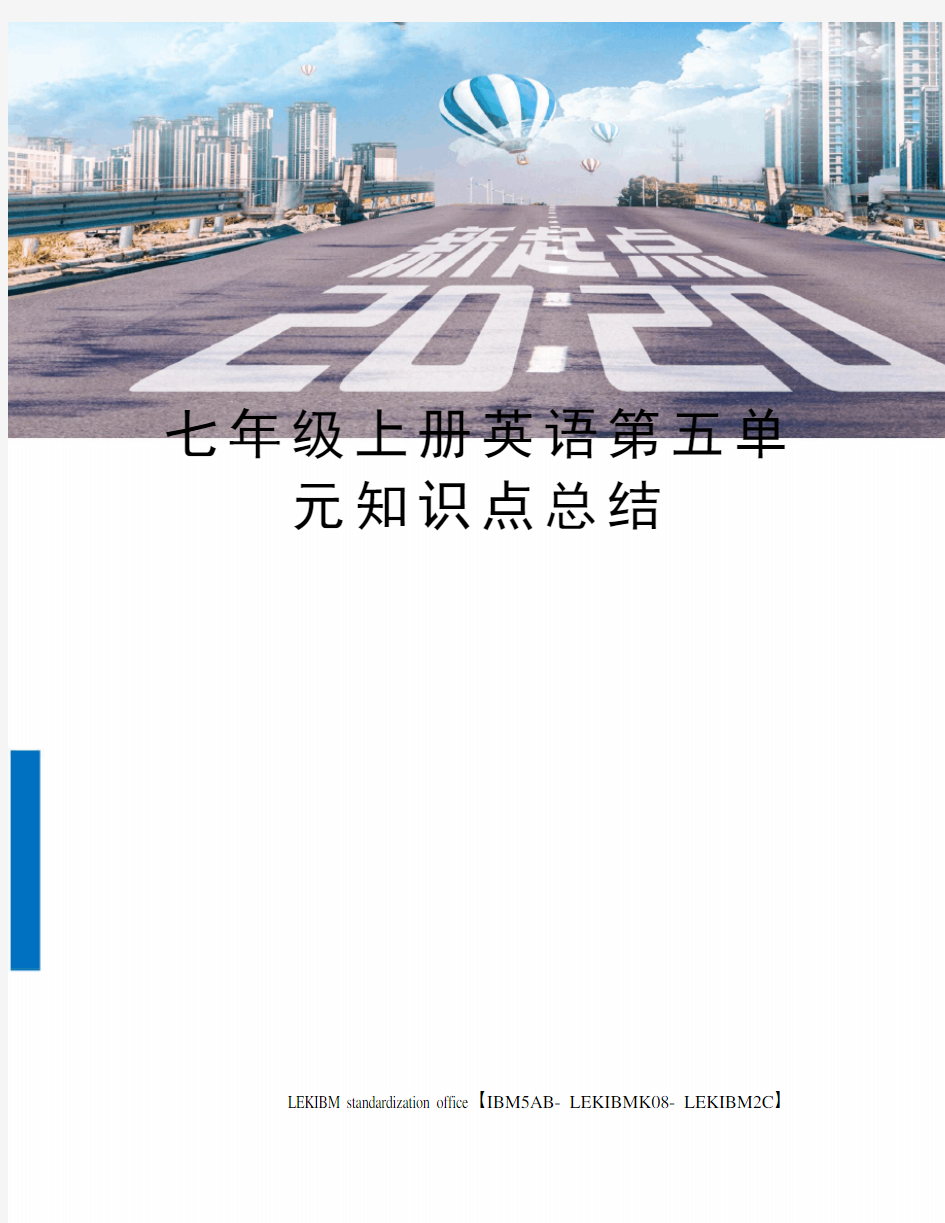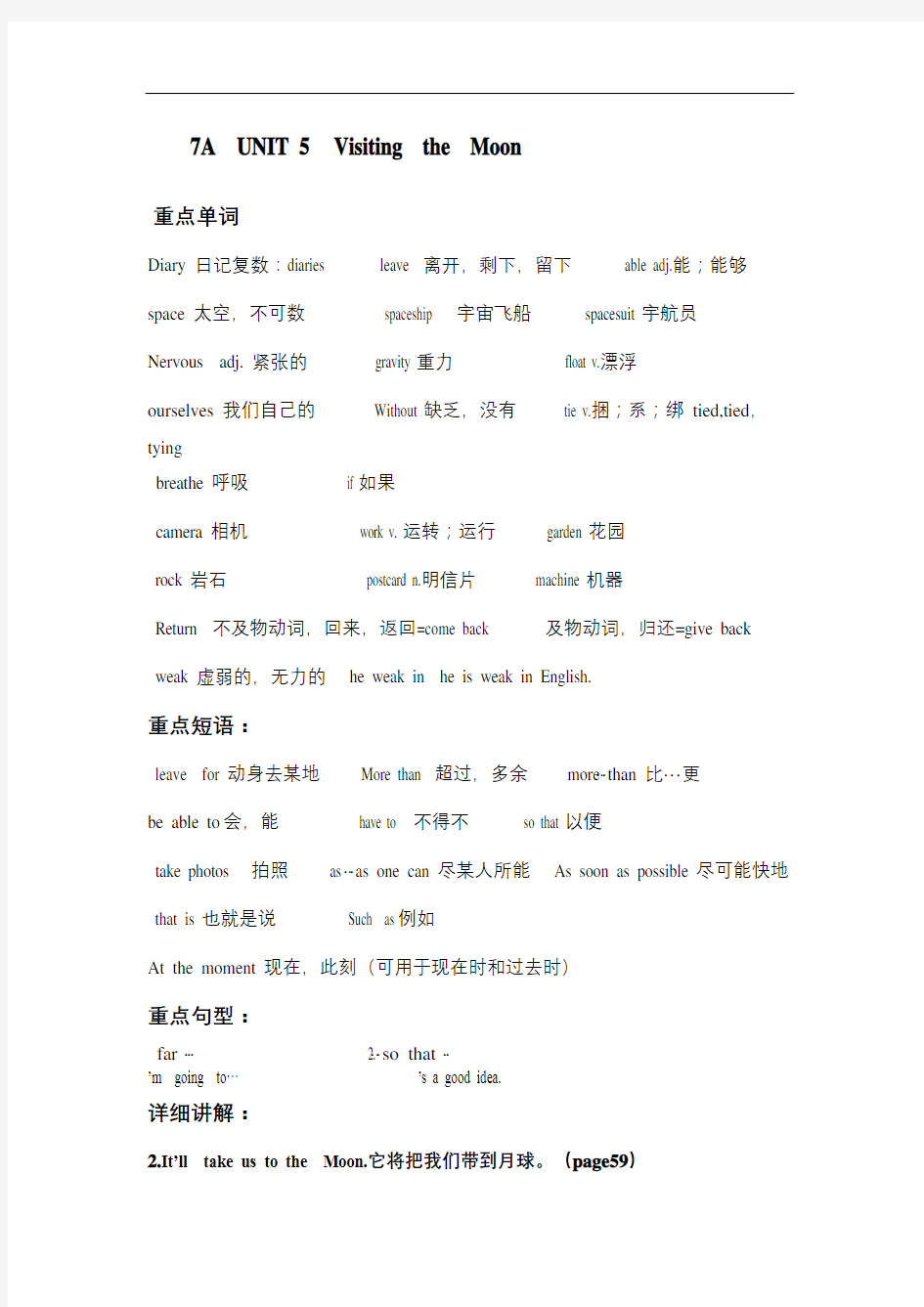七年级上册英语第五单元知识点总结


七年级上册英语第五单
元知识点总结
LEKIBM standardization office【IBM5AB- LEKIBMK08- LEKIBM2C】
7A UNIT 5 Visiting the Moon
重点单词
Diary 日记复数:diaries leave 离开,剩下,留下 able adj.能;能够space 太空,不可数 spaceship 宇宙飞船 spacesuit 宇航员
Nervous adj. 紧张的 gravity 重力 float v.漂浮
ourselves 我们自己的 Without 缺乏,没有 tie v.捆;系;绑 tied,tied,tying
breathe 呼吸 if 如果
camera 相机 work v. 运转;运行 garden 花园
rock 岩石 postcard n.明信片 machine 机器
Return 不及物动词,回来,返回=come back 及物动词,归还=give back weak 虚弱的,无力的 he weak in he is weak in English.
重点短语:
leave for 动身去某地 More than 超过,多余 more···than 比···更
be able to会,能 have to 不得不 so that 以便
take photos 拍照 as ···as one can 尽某人所能 As soon as possible 尽可能快地 that is 也就是说 Such as例如
At the moment 现在,此刻(可用于现在时和过去时)
重点句型:
far ··· 2.···so that ··
’m going to··· ’s a good idea.
详细讲解:
2.It’ll take us to the Moon.它将把我们带到月球。(page59)
Take ···to··把··带到··
3.It’ll take us about four days to get there.将花费我们大约四天时间到达那里。(page59)
It will take sb. Some time to do sth. 花费某人多收时间做某事
一般现在时的结构:It takes sb. Some time to do sth.
一般过去时的结构:It took sb. Some time to do sth.
4.we’ll all be able to float around in the spaceship.我们都能在飞船里漂浮。(page59)
’ll have to tie ourselves to our beds so that we won’t float away in our sleep!(page59)
我们不得不把我们自己系在床上,以便我们睡着事不会漂走。
have to 必须,不得不,后面加动词原形。
3.feed sth. to sb.中的feed后加的是食物,to 后加的是动物或者小孩“用食物喂某人或动物”
feed sb. On sth. 中feed后加人或动物名称,on后加食物“给某人或动物喂点食
物”
4.We will be able to build hotels there in the future.在将来我们将能在那里建造旅
馆(page68)
in the future 巧计:这个的单词组成较长,所以时间范围也比较长5.Thousands of years ago ,there was a Chinese story about Chang’e flying to the Moon.(page70)几千年前,有一个嫦娥奔月的中国传说。
Thousands of 数以千计的
①Hundred (百),Thousand(千),million(百万)等用复数形式修饰时要有··of+复数名词,前面不能加具体的数字。
②Hundred ,Thousand,million,billion(十亿)前面如有具体数字,不能在他们后面加“s”
Grammar
一般将来时:表示将来某个时间要发生的动作或者存在的状态,常与一些表示将来的时间的状语连用。
1.基本结构:一般由“助动词will+动词原形”或者“be going to +动词原形”构成。
2.注意:will是助动词,不能独立使用,前面的主语无论是什么人称,后面都是will。它的否定形式是will not,缩写为won’t.
3.时间状语:tomorrow,next time/week ,in a month/week,from now on ,soon.
4.基本句型:
(1)肯定句:主语+will/be going to +动词原形+其他
如:He will come here at onc.
(2)否定句:主语+won’t/be not going to +动词原形+其他
如:He will not go to Shenzhen.
(3)一般疑问句:Will+主语+动词原形+其他?
Be(am,are,is)+主语+动词原形+其他?
如:Will you help me with my English?
11. Are you going to of S henzhen?
12.
13. (4)特殊疑问句:疑问词+一般疑问句?
14. What will the students have for breakfast?
5.will 和be going to 的区别:
(1)will :与主观意图无关的将来,表示必然要发生的客观规律。
如:The flowers will come out in a few days.
15.(2)be going to:一般表示计划、打算或准备要做的事情,和有迹象将要发生或者肯定要发生的事情。如:Look!It’s going to rain.
